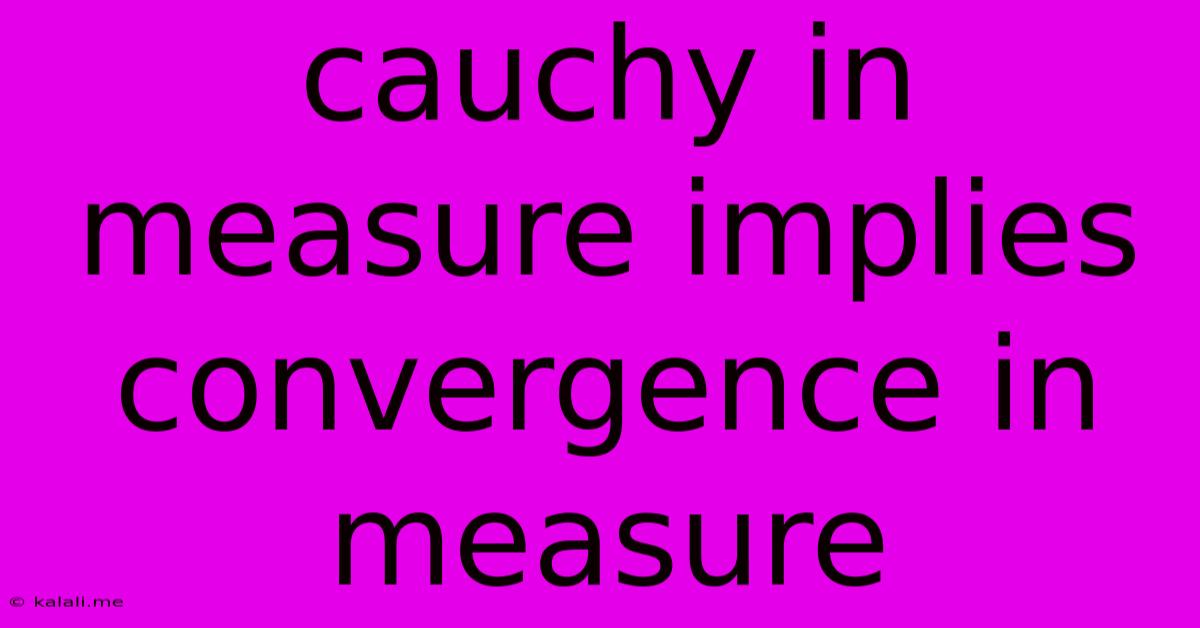Cauchy In Measure Implies Convergence In Measure
Kalali
May 24, 2025 · 4 min read

Table of Contents
Cauchy in Measure Implies Convergence in Measure: A Detailed Explanation
Meta Description: This article provides a clear and concise proof that a Cauchy sequence in measure converges in measure. We explore the definition of Cauchy sequences and convergence in measure, offering a step-by-step demonstration of the implication. We also discuss the significance of this theorem in measure theory.
In measure theory, understanding the relationship between Cauchy sequences and convergence is crucial. This article will rigorously demonstrate that a sequence of measurable functions that is Cauchy in measure also converges in measure. This is a fundamental result with broad implications in the study of integration and probability.
Understanding the Definitions
Before diving into the proof, let's clearly define the key concepts:
1. Convergence in Measure: A sequence of measurable functions {f<sub>n</sub>} converges in measure to a measurable function f on a measurable set E if for every ε > 0,
lim<sub>n→∞</sub> m({x ∈ E : |f<sub>n</sub>(x) - f(x)| ≥ ε}) = 0
where m denotes the measure. Essentially, the measure of the set where the difference between f<sub>n</sub> and f exceeds ε goes to zero as n approaches infinity.
2. Cauchy in Measure: A sequence of measurable functions {f<sub>n</sub>} is Cauchy in measure on a measurable set E if for every ε > 0 and δ > 0, there exists an N such that for all n, m ≥ N,
m({x ∈ E : |f<sub>n</sub>(x) - f<sub>m</sub>(x)| ≥ ε}) < δ
This means that the measure of the set where the difference between any two functions f<sub>n</sub> and f<sub>m</sub> (with sufficiently large n and m) exceeds ε can be made arbitrarily small.
Proving the Implication: Cauchy in Measure implies Convergence in Measure
The proof involves constructing a subsequence that converges pointwise almost everywhere, and then showing that the original sequence converges in measure to the same limit.
1. Constructing a Subsequence: Since {f<sub>n</sub>} is Cauchy in measure, we can find a subsequence {f<sub>n<sub>k</sub></sub>} such that for all k ≥ 1,
m({x ∈ E : |f<sub>n<sub>k+1</sub></sub>(x) - f<sub>n<sub>k</sub></sub>(x)| ≥ 2<sup>-k</sup>}) < 2<sup>-k</sup>
This is achieved by recursively choosing the subsequence elements such that the measure of the set where the difference between consecutive terms exceeds 2<sup>-k</sup> is less than 2<sup>-k</sup>.
2. Pointwise Almost Everywhere Convergence of the Subsequence: Consider the set A<sub>k</sub> = {x ∈ E : |f<sub>n<sub>k+1</sub></sub>(x) - f<sub>n<sub>k</sub></sub>(x)| ≥ 2<sup>-k</sup>}. By the Borel-Cantelli Lemma, since Σ<sub>k=1</sub><sup>∞</sup> m(A<sub>k</sub>) < ∞, the measure of the set A = ∪<sub>k=N</sub><sup>∞</sup> A<sub>k</sub> goes to zero as N goes to infinity. This means that the subsequence {f<sub>n<sub>k</sub></sub>} is a Cauchy sequence almost everywhere on E \ A, and thus converges pointwise almost everywhere on E to a function, say f.
3. Convergence in Measure of the Original Sequence: Now, we need to show that the original sequence {f<sub>n</sub>} converges in measure to f. Let ε > 0 and δ > 0. Since {f<sub>n</sub>} is Cauchy in measure, there exists an N such that for all n, m ≥ N,
m({x ∈ E : |f<sub>n</sub>(x) - f<sub>m</sub>(x)| ≥ ε/2}) < δ/2
Let m = n<sub>k</sub> where n<sub>k</sub> is chosen from the subsequence such that n<sub>k</sub> ≥ N. Then,
m({x ∈ E : |f<sub>n</sub>(x) - f(x)| ≥ ε}) ≤ m({x ∈ E : |f<sub>n</sub>(x) - f<sub>n<sub>k</sub></sub>(x)| ≥ ε/2}) + m({x ∈ E : |f<sub>n<sub>k</sub></sub>(x) - f(x)| ≥ ε/2}) < δ/2 + δ/2 = δ
for sufficiently large k and n. This demonstrates that the original sequence {f<sub>n</sub>} converges in measure to f.
Conclusion
This proof establishes the crucial relationship between Cauchy sequences and convergence in measure. This theorem is a cornerstone in measure theory, providing a foundational tool for analyzing and working with sequences of measurable functions. It underpins many further developments in integration theory and probability. Understanding this theorem is essential for anyone delving deeper into these areas of mathematics.
Latest Posts
Latest Posts
-
What Gauge Wire For 20 Amp
May 24, 2025
-
Why Does Voldemort Want To Kill Harry
May 24, 2025
-
How To Get Oil Off Driveway
May 24, 2025
-
How Long Can Tuna Salad Last In The Fridge
May 24, 2025
-
How To Get More Dwellers In Fallout Shelter
May 24, 2025
Related Post
Thank you for visiting our website which covers about Cauchy In Measure Implies Convergence In Measure . We hope the information provided has been useful to you. Feel free to contact us if you have any questions or need further assistance. See you next time and don't miss to bookmark.